- Home
- Chris Wraight
Stormcaller
Stormcaller Read online
It is the 41st millennium. For more than a hundred centuries the Emperor has sat immobile on the Golden Throne of Earth. He is the master of mankind by the will of the gods, and master of a million worlds by the might of his inexhaustible armies. He is a rotting carcass writhing invisibly with power from the Dark Age of Technology. He is the Carrion Lord of the Imperium for whom a thousand souls are sacrificed every day, so that he may never truly die.
Yet even in his deathless state, the Emperor continues his eternal vigilance. Mighty battlefleets cross the daemon-infested miasma of the warp, the only route between distant stars, their way lit by the Astronomican, the psychic manifestation of the Emperor’s will. Vast armies give battle in his name on uncounted worlds. Greatest amongst His soldiers are the Adeptus Astartes, the Space Marines, bio-engineered super-warriors. Their comrades in arms are legion: the Astra Militarum and countless planetary defence forces, the ever-vigilant Inquisition and the tech-priests of the Adeptus Mechanicus to name only a few. But for all their multitudes, they are barely enough to hold off the ever-present threat from aliens, heretics, mutants – and worse.
To be a man in such times is to be one amongst untold billions. It is to live in the cruellest and most bloody regime imaginable. These are the tales of those times. Forget the power of technology and science, for so much has been forgotten, never to be re-learned. Forget the promise of progress and understanding, for in the grim dark future there is only war. There is no peace amongst the stars, only an eternity of carnage and slaughter, and the laughter of thirsting gods.
Prologue
Always cold.
Cold at the moment of dawn when the red sun slid above the fields of ice like a clot of blood. Cold at the heart of the day when the ice cracked under grey, feathered skies. Cold in the long nights – bone-aching cold, cold that sunk under the skin and lodged fast.
Men could go mad from it, weeping as their fingers blackened and softened. When the pain grew too much, they would scream their hopelessness at the stars, and that brought beasts to the flickering circles of the fires. Screams always brought beasts, as lean and hungry as those who huddled at the flame-pits. Once you let the cold make you scream, that was the end. Fenris ended the weak quickly.
It was near the end of the long winter-spell when he was born, bloody and motley, wailing before being silenced by rags as the wind made the tent walls drum. The highlands were cracking by then, opening up like parted flesh. Faer told them change would come before the fire-summer, so they had to move, packing hide tents onto sleds and skiffs and wrapping them hard with leather twine.
Ana, his mother, was fifteen seasons as the Terrans reckoned it and as tough as knucklebones. When the dawn came she was ready, wrapped in furs, her face swathed from the blast-wind, her pale hands clutching the cords of her back-strapped cradleboard.
They walked in teams, dragging goods on long sleds, heading south towards the long, grey firth where the hvalari snorted and dived. The skies were low and stone-grey, blurred by fine rain that felt like ice when it hit. Mountains rose up in the north, bleak and dagger-sided, kindling thunder. Those mountains had no name, for they had stood less than a child’s lifetime. Only one range on Fenris had a name. Only one range endured more than a mortal span, and the Ascurii knew of that range only through the sagas of Faer.
They went three days before the land ahead of them changed. Ice cracked underfoot, spreading like uncurling dark fingers as their leather-wound feet kicked through the slush. Ana gritted her teeth, bending against the weight of the bundle on her back. She suckled the infant on the move, pulling him round, trudging, staying silent.
He never cried. No infants on Fenris cried once the immense cold first washed over them – they kept their mouths clammed shut, their fists balled, their black eyes staring. He stayed swaddled tight on the cradleboard, limbs pressed to his body to retain heat, covered in a thick layer of deer pelt and grass, only his eyes and nose exposed.
Faer halted on the morning of the fourth day. Totems rattled under his arms, swinging from lengths of twine. The Ascurii stood in straggling groups around him, huddling under the shade of bony furu pines. They numbered no more than sixty by then, worn down and harrowed by the Long Winter. The men’s skin was drawn tight over bone and wrinkled dry like cured fish. The women’s faces were chapped from the wind, blotched red and white, their eyes narrowed. Their breath steamed in the morning mist, catching on furs and cloaks and drifting into the white sky.
Faer looked out over the firth as it stretched away towards a lowering horizon – lead-matt, crested with the froth of choppy water, studded with drifting ice. In the far west rose the sky-blue wall of a glacier, and beyond that the piled-high landmass of the Greater Island.
That land might survive for a dozen seasons, or one, or none. It looked sturdy enough, but no one could tell. The world was in constant change from one Great Year to the next, and that was the way of it. None complained, for none knew any different – you might as well complain about the bloodpox, or the golden-eyed wolves that roamed the islands like ravenous shadows, or the ravens that squatted over cooling corpses after the gore had sunk among the stones.
Faer’s eyes narrowed. It wasn’t far. They could rebuild and refit the boats within the week, and be over to the other side in less than a day. If the storms held, it would be no more perilous than when they’d last crossed the deep.
Jorund clumped over to stand by him. The big headman pulled his cloak tight around his burly shoulders, sending a shiver of snow rattling down his back.
‘We go?’ he grunted, watching what Faer was watching.
The shaman nodded, and his straggling beard pressed up against the folds of coarse fabric at his neck.
‘Others will be there, too,’ said Jorund, doubtfully.
Faer nodded again. ‘Ice and iron,’ he mumbled.
‘We are weak.’
‘We cannot stay here,’ said Faer, turning his milky eye towards the headman. ‘You want to stay? The land is fire-cursed. It will crack soon.’
Jorund’s grey eyes scanned the firth. A month ago it had been solid with ice, thick enough for a heavy skiff. Making the boats ready would be backbreaking.
He looked up at the glacier. The land beyond was dark with trees, needling up against the horizon in tight rows.
It was a big island, a solid island, with deep roots. Many would contest the land – it would have prey under the branches, and predators watching the prey.
As Jorund thought and watched, the ice around him sighed and creaked. He looked down to see a fissure opening between his feet, just a finger’s-breadth wide. The gap filled with water.
‘We go, then,’ he growled, stepping away. He turned to the others. They stared back at him, expectant. ‘We go,’ he told them, clapping his frozen hands together to get the blood flowing.
Ana looked up at him. Her round face was shiny with fatigue. Her trothed man, Aesgir, stood at her side, supporting her with one hand, dragging his sled with the other.
They knew the danger. The child might not survive the crossing. Ana was weak still; she might not, either.
‘Have you named him?’ Jorund asked Ana.
Ana shook her head.
‘Name him,’ he said. ‘The gods must know him.’
Ana nodded, understanding.
Then she turned and began to unload tools from the sled. No one said anything more. One by one, the Ascurii got to work.
Only two boats foundered on the way over, tipped up by the crash of surf against floes; the rest scraped home against the icy gravel of the shoreline. The survivors clambered up a long incline towards higher ground. Once the boats were hauled high onto
the glass-ice and stone, the men took up flat-bladed spears and throwing axes. They crept up into the rocky uplands, hanging together, their bodies crouched.
Jorund was wrong – there were no others there before them. They climbed up above the shoulder of the glacier, crouching against knife-hard winds from the open ocean. Immense forests stretched away from them, pine-dark, close like fur. The ground was the colour and density of steel.
Faer went quickly, confidently, guided by his visions. The tattoos on his withered skin looked bright blue in the hard light, like veins. He pulled on his old staff, and the bones and vision-trinkets jangled.
At the summit of the massif above the glacier’s southerly flank, he paused. He lifted his wiry arms into the air, and his filthy rags fell from them, exposing skin to the ice-bite.
‘New land!’ he shouted. His voice echoed flatly. A broody forest line glared back at him, and the wind scoured across empty stone and milk-white ice and the obsidian shade of the deep wood.
Ana clutched her child close to her, listening for the rattle-growl of beasts. She had the keenest hearing of the Ascurii.
Nothing yet, but they would come. They would already be uncurling in the dark, sniffing, salivating, stretching.
Aesgir came to her side. ‘Anything?’
Ana shook her head, but said, ‘Baldr,’ quietly, lest Faer hear.
‘For the boy?’
Ana nodded, and Aesgir smiled, exposing the half-toothed jaw he’d carried ever since the fighting against the Gyeths.
‘Yes. Baldr. He is awake?’
Ana wrenched the cradleboard around from her shoulder, exposing the infant swaddled within. Two dark eyes peered from the straw and leather, steady, unmoving, solemn.
Aesgir grinned again and ran his fingers over the boy’s face. ‘Always awake. Never sleeps.’
Ana pulled him away, hoisting him back onto her shoulder. ‘What is there to sleep for?’
Aesgir looked at her, irritated that she’d pulled him away. He was about to speak when Jorund strode past, axe drawn.
‘Further up,’ he grunted, beckoning the others on. He glared at Ana for a moment. ‘Night will come.’
Then they were moving again, dragging the boats with them, the sleds, the leather sacking and the spear-bundles, clattering it across scree and moss, searching.
Above them, the white sky stretched, remorseless, empty, like a void.
They did not name the place they built, for it would be gone soon enough, just like everywhere else, so it was just the settlement, the hearth, the fire, the aett. Jorund drove them hard. They raised a stockade, first using the wood of the boats they had brought, then trunks felled from the forest. They hammered the beams in, digging out the frost-rimed earth with picks. The women worked with the men, hauling, tying, hacking. By the time the sun set, all of them were shining with sweat.
The fire was lit on the first night. It roared with a blaze the height of a skiff-sail, throwing bloody shadows across the snow and turning it to grey puddles. The warriors stood guard, all of them, none sleeping, fingering axes watchfully.
Jorund was the tallest, his heavy grey cloak hanging stiffly, his frost-crusted beard jutting from under a low hood. Ana watched him from the fireside, where she was nursing Baldr. She couldn’t see Aesgir – he must have been on the far side. Faer mumbled somewhere in the shadows, squatting and rocking in his visions.
As the sun went down, shadows crept out from the eaves of the forest. The air chilled fast, searing against sweat-cooled skin. Stars pricked into the sky, vivid like the jewel-belt of the gods.
Ana heard them first, as always – low, gurgling growls. They were a long way off, drumming along the earth from far away, deep away. The sounds echoed in the gathering dusk, making the hairs on the back of her arms rise.
Baldr stirred in her arms. He broke from her. His dark eyes glistened in the fire-glow, wide and unafraid. He listened.
Ana smiled at him. ‘The wolves, Baldr,’ she breathed, wiping a droplet of milk from his sombre mouth.
By then, the others had heard. The men tensed as they stood around the fire, their bodies black against the half-built stockade. Long spears swayed as their bearers peered into the night. Blades were drawn from leather-bound scabbards, each inscribed with scratch-runes by Faer.
Ana rocked the child, though he needed no comfort. ‘The wolves,’ she whispered again.
He was not looking at her. He twisted his head, trying to see where the noise was coming from.
‘More fire,’ ordered Jorund, his voice tight. Logs were thrown on, spitting and cracking, sending sparks spiralling into the frigid night.
Baldr didn’t like the ligh; he screwed his eyes against it, smearing balled fists over his ruddy face. But the sound – the purring, damp, hot catch of clustered lupine throats – that made him listen.
Ana watched it, and her heart warmed.
It was a good sign. A sign of the god-marked, of the iron-hearted.
‘Listen to them,’ she told him. ‘Listen. They will kill you, if they find you. They will tear you apart if they catch you before you are made strong. They will hunt you, run you down.’
She grabbed his head and turned it to her.
‘But if you live, Baldr Ascurii, if you live…’ She gazed at him with a hungry, desperate love. ‘You will hunt them.’
It was a hard first year. Johana died when with child, and Beorth was gored when he got separated from Jorund’s hunt-party. After, the Summer of Fire came, burning across the boiling seas like a fever, and pox ravaged the Greater Island, sending ten to the neverworld, their faces stark and staring with fear. They would not have been afraid to die with axe in hand, but a sickbed promised no glory.
Baldr lived. He thrived as the months passed, growing strong on milk and hunt-meat. Aesgir fed him blood from the meat of slain konungur, and he lapped it greedily, licking stringy matter from the sinew.
Ana watched him shoot upwards, tottering on his bent legs as the Summer faded, learning to hold a hilt as the Long Winter gripped the land again. She watched as he spoke the first word – axe – and the second – father. She watched him as Jorund showed him how to fish, to stalk, to handle a blade, and she watched him as Faer initiated him into the mysteries. Baldr’s expression never changed: his dark eyes followed his teachers, drinking in their knowledge. His sombre face remained still. When the others ran the hunt, roaring their fear out and their fury, he stayed silent, like a shadow in daylight, grey and ephemeral.
He listened to Faer most closely. He would crouch at the man’s feet, silent as the tales of old wyrds and deeds were mumbled into the flickering flames. He would watch the bones spiral on their cords, and reach out for them, as if he could pull them all to him.
‘Is he marked?’ Ana asked Faer once, after seeing Baldr scratch the outlines of runes in the dirt, intent and obsessive.
Faer’s mouth creased equivocally, making the rings in his nose jangle. ‘He is a hunter. A strong one.’
That satisfied her. She wrapped her cloak about her and felt the cold stir in the air again as the winter came in.
It was no life, to be among the runes and the knucklebones. Better to have spear in hand and run with the packs, to eat meat and drink blood and become a warrior of the vlka.
Baldr was quiet. He was placid. He would have to learn to be angry soon, for Fenris did not shelter calm souls.
So she watched him, and waited for the fire to come. She knew it would do, that it must do, but did not know when.
Four more Great Years passed. More were born, more died. The wolves took Aesgir one night, as they often did when hunters became too bold or were too unlucky, and so Ana kept hearth alone. The aett did not flourish. Wind blew hard across the highlands, scraping at the wood and making the hide tents shiver. Faer’s vision had saved them from the cracking earth, but it had not led them to pl
enty. They hacked a living from the iron-tough earth, hunting the skirts of the forest, cheating what prey they could from the dripping maws of greater predators.
Baldr took his father’s place in the hunting pack, adopting the axe. Faer gave him the hunt-mark on his shoulder. Baldr made no sound as the ink-needle went in, piercing flesh and giving him the icon of the fjolnir – the nightjar.
He went with them after that – thirty men of the Ascurii, clad in furs, each bearing spears or axes. His was the only beardless face, as smooth as a nutshell; he was brown-haired, clean-featured.
They walked in file, heading up the path of a half-frozen river into the jagged country west of the great glacier. Water had run clear for the long summer but was now steadily choking as the ice stretched down from the peaks. Baldr’s fingers were stiff with cold as he clutched his axe, his breath steaming.
The air thinned as they climbed, taking them up winding paths and into the heights. The trees were old by the standards of the ever-changing world – a dozen Great Years, perhaps – and their bark was oil-dark and gnarled like rope.
Jorund paused, crouching low, sniffing, and the party waited silently. The headman’s flinty beard brushed against the ground as he stooped. Eventually he got back to his feet. He was moving stiffly. Baldr watched him move, and wondered how long it would be before a challenger tested Jorund’s mettle.
‘Higher up,’ Jorund grunted, and they set off again.
The trees rose up on either side, vast as pillars, covering the land in darkness. Snow piled high against the trunks, glowing a soft blue in the darkness, and the paths silted up with it. Baldr strode with the others, axe clutched tight.
Hours passed, marked only by the trudging steps, the brush of snow against leather, the drip and crack of the deep forest.
Then Jorund got wind of something, and beckoned the others to halt. He sniffed, holding his grizzly head high into the oncoming wind. He stayed motionless for a long time.
Baldr sniffed too, taking care to draw the air in silently.
Musk, he thought. Tilbrád. Far off. Meagre.

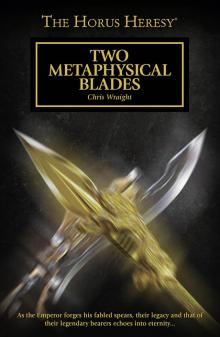 Two Metaphysical Blades
Two Metaphysical Blades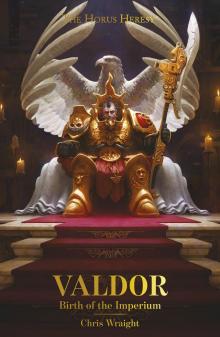 Valdor: Birth of the Imperium
Valdor: Birth of the Imperium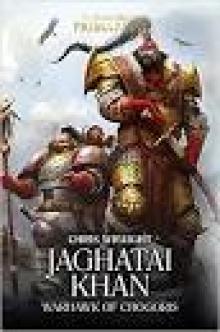 JAGHATAI KHAN WARHAWK OF CHOGORIS
JAGHATAI KHAN WARHAWK OF CHOGORIS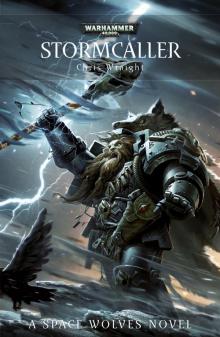 Stormcaller
Stormcaller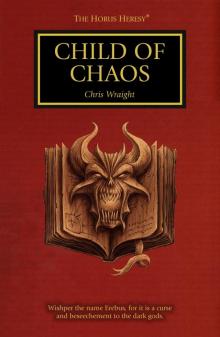 Child of Chaos
Child of Chaos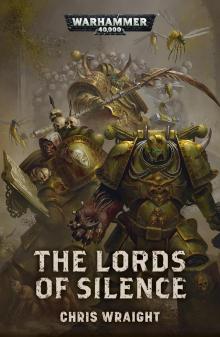 The Lords of Silence
The Lords of Silence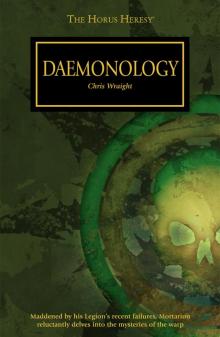 Daemonology
Daemonology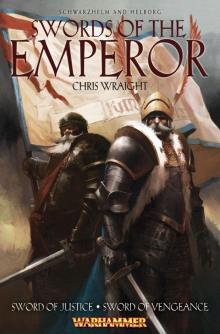 Swords of the Emperor
Swords of the Emperor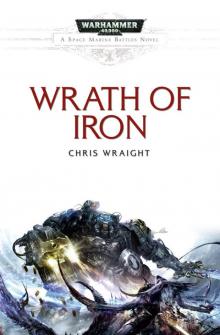 Wrath of Iron
Wrath of Iron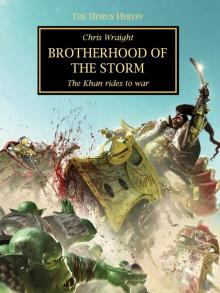 Brothers of the Storm
Brothers of the Storm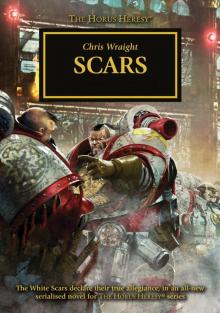 Horus Heresy: Scars
Horus Heresy: Scars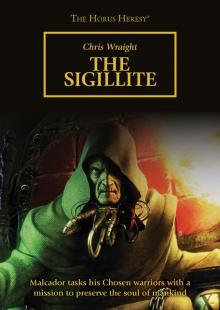 The Sigillite
The Sigillite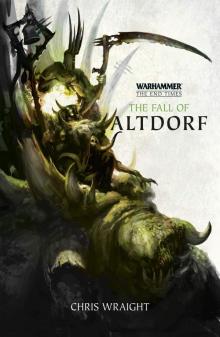 The End Times | The Fall of Altdorf
The End Times | The Fall of Altdorf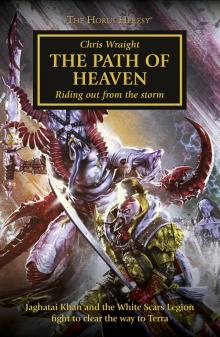 The Path of Heaven
The Path of Heaven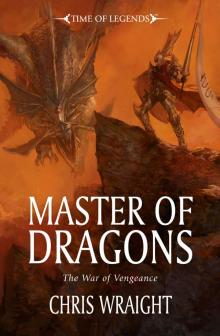 Master of Dragons
Master of Dragons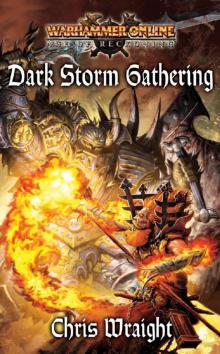 WH-Warhammer Online-Age of Reckoning 02(R)-Dark Storm Gathering
WH-Warhammer Online-Age of Reckoning 02(R)-Dark Storm Gathering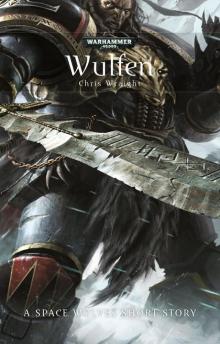 Wulfen
Wulfen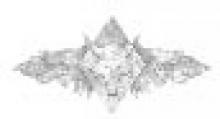 Battle Of The Fang
Battle Of The Fang Onyx
Onyx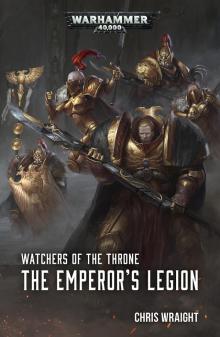 Watchers of the Throne: The Emperor’s Legion
Watchers of the Throne: The Emperor’s Legion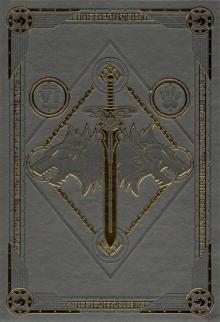 Leman Russ: The Great Wolf
Leman Russ: The Great Wolf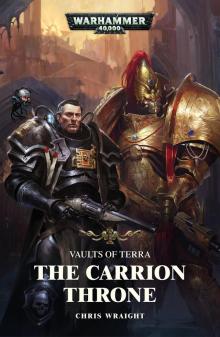 Vaults of Terra: The Carrion Throne
Vaults of Terra: The Carrion Throne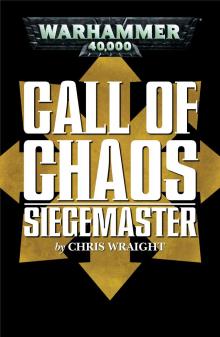 Siegemaster
Siegemaster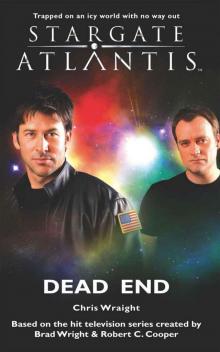 STARGATE ATLANTIS: Dead End
STARGATE ATLANTIS: Dead End Scars
Scars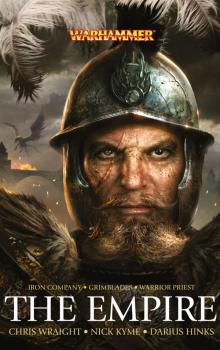 The Empire Omnibus
The Empire Omnibus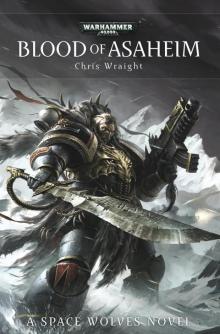 Blood of Asaheim
Blood of Asaheim